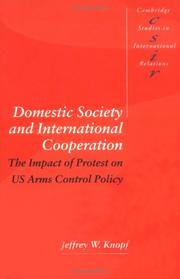| Listing 1 - 3 of 3 |
Sort by
|
Book
ISBN: 0804771243 9780804771245 9780804756310 0804756317 9780804756327 0804756325 Year: 2009 Publisher: Stanford, Calif.
Abstract | Keywords | Export | Availability | Bookmark
 Loading...
Loading...Choose an application
- Reference Manager
- EndNote
- RefWorks (Direct export to RefWorks)
Confronting the Bomb tells the dramatic, inspiring story of how citizen activism helped curb the nuclear arms race and prevent nuclear war. This abbreviated version of Lawrence Wittner's award-winning trilogy, The Struggle Against the Bomb, shows how a worldwide, grassroots campaign—the largest social movement of modern times—challenged the nuclear priorities of the great powers and, ultimately, thwarted their nuclear ambitions. Based on massive research in the files of peace and disarmament organizations and in formerly top secret government records, extensive interviews with antinuclear activists and government officials, and memoirs and other published materials, Confronting the Bomb opens a unique window on one of the most important issues of the modern era: survival in the nuclear age. It covers the entire period of significant opposition to the bomb, from the final stages of the Second World War up to the present. Along the way, it provides fascinating glimpses of the interaction of key nuclear disarmament activists and policymakers, including Albert Einstein, Harry Truman, Albert Schweitzer, Norman Cousins, Nikita Khrushchev, Bertrand Russell, Andrei Sakharov, Linus Pauling, Dwight Eisenhower, Harold Macmillan, John F. Kennedy, Randy Forsberg, Mikhail Gorbachev, Helen Caldicott, E.P. Thompson, and Ronald Reagan. Overall, however, it is a story of popular mobilization and its effectiveness.
Antinuclear movement --- Nuclear disarmament --- Anti-nuclear movement --- Antinuclear protest movement --- Nuclear freeze movement --- Protest movement, Antinuclear --- Social movements --- Nuclear power plants --- History. --- Mouvement antinucléaire --- Désarmement nucléaire --- Histoire

ISBN: 0511005679 9780511005671 0521622409 0521626919 Year: 1998 Volume: 60 Publisher: Cambridge, U.K. New York Cambridge University Press
Abstract | Keywords | Export | Availability | Bookmark
 Loading...
Loading...Choose an application
- Reference Manager
- EndNote
- RefWorks (Direct export to RefWorks)
Nuclear arms control --- Antinuclear movement --- Security, International. --- Security, International --- Law, Politics & Government --- International Relations --- Collective security --- International security --- International relations --- Disarmament --- International organization --- Peace --- Nuclear weapons control --- Arms control --- Nuclear weapons --- Government policy --- Armes nucléaires --- Mouvement antinucléaire --- Sécurité internationale --- Contrôle --- Politique gouvernementale
Book
ISBN: 1299456979 0199947090 9780199947096 9780199947089 0199947082 9781299456976 019999109X Year: 2013 Publisher: New York : Oxford University Press,
Abstract | Keywords | Export | Availability | Bookmark
 Loading...
Loading...Choose an application
- Reference Manager
- EndNote
- RefWorks (Direct export to RefWorks)
This title explores the complex intellectual and cultural roots of Greenpeace, tracing the development of the organization from its emergence amidst the various protest movements of the 1950s and 1960s to the end of its volative, dramatic, and at times quirky first decade in 1980.
Environmental protection --- Antinuclear movement --- Environmentalism --- Counterculture --- Counter culture --- Countercultures --- Culture --- Hippies --- Subculture --- Anti-nuclear movement --- Antinuclear protest movement --- Nuclear freeze movement --- Protest movement, Antinuclear --- Social movements --- Nuclear disarmament --- Nuclear power plants --- Environmental quality management --- Protection of environment --- Environmental sciences --- Applied ecology --- Environmental engineering --- Environmental policy --- Environmental quality --- Political aspects. --- History. --- Greenpeace International --- Stichting Greenpeace Council --- Совет Гринпис --- Sovet Grinpis --- Greenpeace, Affaire (1985) --- Environnement --- Mouvement antinucléaire --- Écologisme. --- Contre-culture. --- Protection --- Aspect politique. --- Histoire. --- Mouvement antinucléaire --- Écologisme.
| Listing 1 - 3 of 3 |
Sort by
|

 Search
Search Feedback
Feedback About UniCat
About UniCat  Help
Help News
News